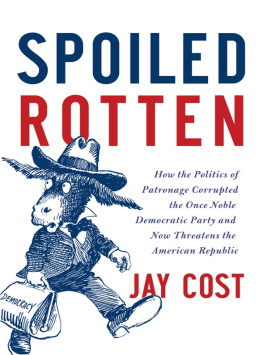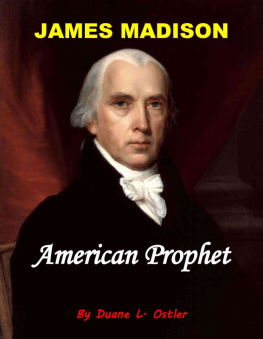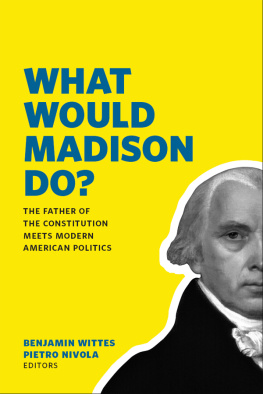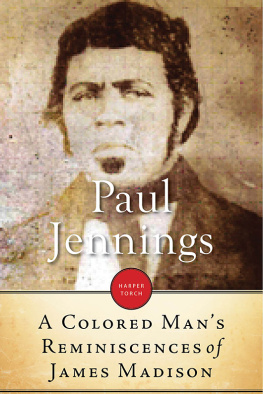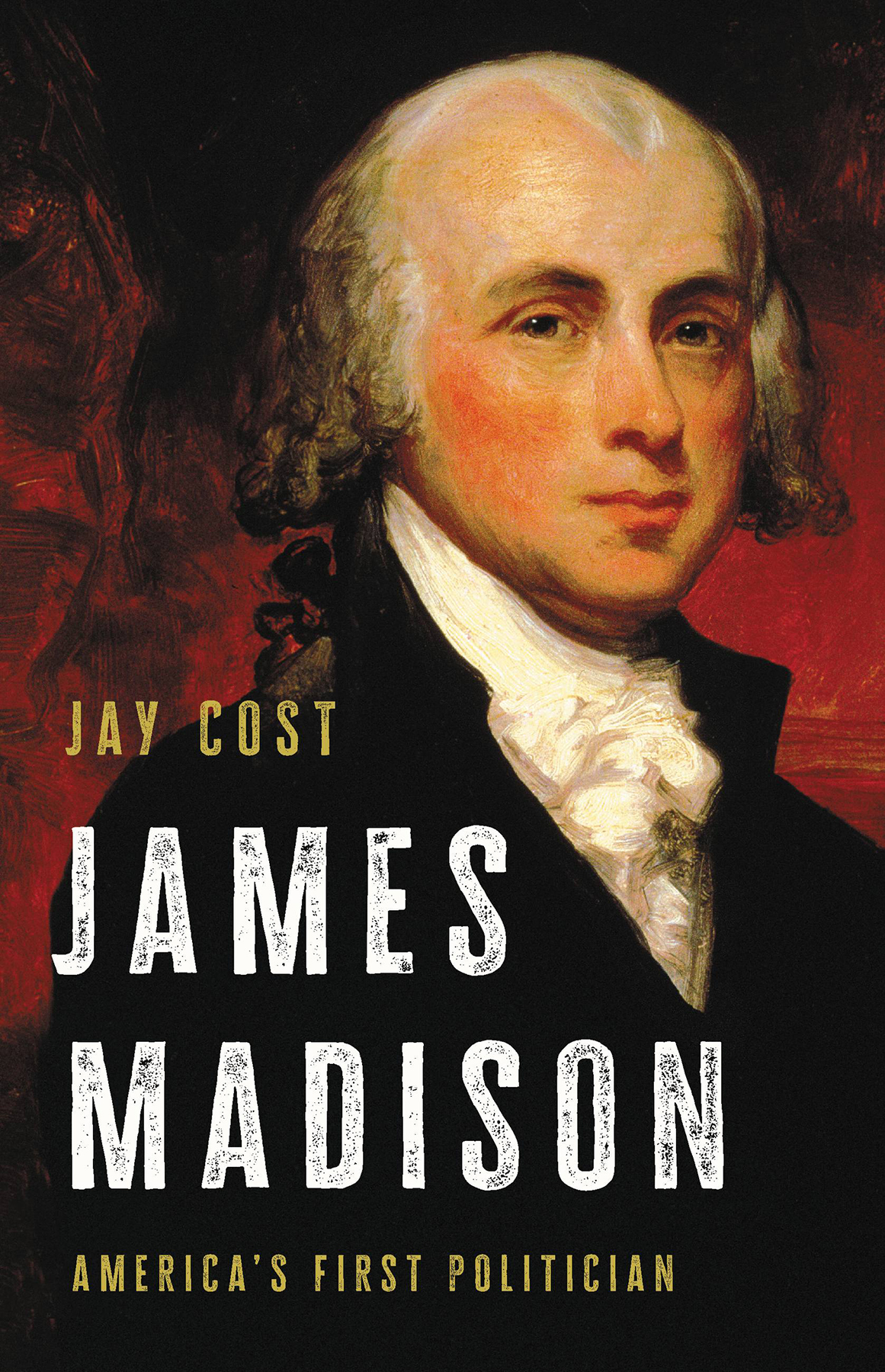
Copyright 2021 by Jay Cost
Cover design by Shreya Gupta
Cover image Musee de la Cooperation Franco-Americaine, France / Bridgeman Images
Cover copyright 2021 by Hachette Book Group, Inc.
Hachette Book Group supports the right to free expression and the value of copyright. The purpose of copyright is to encourage writers and artists to produce the creative works that enrich our culture.
The scanning, uploading, and distribution of this book without permission is a theft of the authors intellectual property. If you would like permission to use material from the book (other than for review purposes), please contact permissions@hbgusa.com. Thank you for your support of the authors rights.
Basic Books
Hachette Book Group
1290 Avenue of the Americas, New York, NY 10104
www.basicbooks.com
First Edition: November 2021
Published by Basic Books, an imprint of Perseus Books, LLC, a subsidiary of Hachette Book Group, Inc. The Basic Books name and logo is a trademark of the Hachette Book Group.
The Hachette Speakers Bureau provides a wide range of authors for speaking events. To find out more, go to www.hachettespeakersbureau.com or call (866) 376-6591.
The publisher is not responsible for websites (or their content) that are not owned by the publisher.
Library of Congress Cataloging-in-Publication Data
Names: Cost, Jay, author.
Title: James Madison : Americas first politician / Jay Cost.
Other titles: Americas first politician
Description: First edition. | New York : Basic Books, 2021. | Includes bibliographical references and index.
Identifiers: LCCN 2021019211 | ISBN 9781541699557 (hardcover) | ISBN 9781541699540 (ebook)
Subjects: LCSH: Madison, James, 17511836. | PresidentsUnited StatesBiography. | StatesmenUnited StatesBiography. | United StatesPolitics and government17831809. | United StatesPolitics and government18091817.
Classification: LCC E342 .C67 2021 | DDC 973.5/1092 [B]dc23
LC record available at https://lccn.loc.gov/2021019211
ISBNs: 978-1-5416-9955-7 (print), 978-1-5416-9954-0 (ebook)
E3-20210922-JV-NF-ORI
For James and Evelyn
For the convenience of the reader, I have altered some of the spelling, capitalization, punctuation, and typographical emphases of historical passages to make them conform to modern conventions. No substantive changes of any sort have been made to direct quotations.
In 1827, Charles Ingersoll, a Philadelphia lawyer and politician, gave a public toast for James Madison in which he declared, If Washington was the father of our country, Mr. Madison is entitled to be considered the father of that Constitution. When Madison died in 1836, former president John Quincy Adams paid tribute with the same moniker, and so Madison has been remembered ever since as the Father of the Constitution.
There are certainly good reasons to bestow upon Madison such an august title. He gave 167 speeches, made seventy-two motions, and served on four committees at the Constitutional Convention in 1787, and he bequeathed to history a voluminous set of notes on the proceedings. Most importantly, Madison authored the Virginia Plana bold call for a total redesign of the national government that set the agenda for the convention and established the foundation upon which the Constitution would be built.
Yet Father of the Constitution is not a nickname Madison would ever have used. The fourth president was always the first to remind his fellow countrymen that the nations founding charter was a joint effort and that no single person could claim paternity. And while his demurral can be chalked up to his characteristic modesty, he still had a point. Though Madison arguably contributed more to the creation of the Constitution than any other single delegate, there were a half dozen or so others whose efforts also mark them for special distinction, including John Dickinson, Oliver Ellsworth, Gouverneur Morris, John Rutledge, and Roger Sherman. To single Madison out as the father of the Constitution undervalues the efforts of these delegates.
And yet Ingersolls sobriquet has been stubbornly sticky, perhaps because Madisons contributions to the continuing project of establishing the new government after the Constitutional Convention was finished can feel enigmatic, or even contradictory. He sometimes comes across the pages of history like a man without fixed political principles. He argued against political parties in 1787 but helped create the Republican Party (today referred to as the Democratic-Republican Party) in 1791. In the 1790s, he argued that powers not clearly established under the Constitution, like chartering a bank, were forbidden, but he looked the other way when the government incorporated the territory of Louisiana in 1804, for which there was no explicit constitutional sanction. Then, as president in 1816, he signed into law a charter for a new national bank.
Unfortunately, Madison did little over the years to clarify exactly what he was on about. This might be why some biographers have been so aggressive in periodizing Madison, breaking his life up into discrete, manageable chunks where his positions can be properly identified. Irving Brant started this trend back in the 1940s with his magisterial six-volume biography, published over twenty years, with each entrys title identifying the Madison of that moment: The Virginia Revolutionist , The Nationalist , Father of the Constitution , and so on. More recently, Noah Feldman took this approach to its logical conclusion by naming his biography The Three Lives of James Madison: Genius, Partisan, President , implying that Madison somehow transitioned from embodying one role to another over the decades. Nearly two hundred years since his death, it seems that Madison remains a difficult man to pin down. Better to think of him as two, maybe three different men.
But Madison was, of course, a single persona brilliant and deep thinker who made careful arguments about what republican government should look like. The facts of his life have been well told, by these and many other books dating back to William Cabell Rivess History of the Life and Times of James Madison , the first volume of which was published before the Civil War. Yet the story still feels somehow incomplete, like pieces of a puzzle that have not been put together. To create a full portrait of Madison, we must connect his constitutional theory to his career in government, looking carefully at his life in the public realm to find the continuities between the theory and practice of politics. When we do, we find a man uniquely committed to the potential for well-ordered republican politics to solve the essential problem of government.
Philosophers since the very beginning of Western civilization have been confounded by a riddle embedded deep within human nature. People cannot create justice among themselves spontaneously. We are too selfish to place the needs of our neighbors or the community ahead of our own desires. This is the primary task of the state: to act as a neutral third party to settle our disputes and promote our common interests, because we cannot do so on our own. The problem is that government is also made up of people, and so it likewise has a tendency toward corruption, pursuing the interests of the leaders rather than the people at large. The ancient Greeks like Aristotle were aware of this problem, as were historians and philosophers from the Roman era like Polybius and Cicero. During the Renaissance, it was on the mind of Machiavelli, and in the Enlightenment it was a central concern for intellectuals such as Montesquieu and David Hume.


